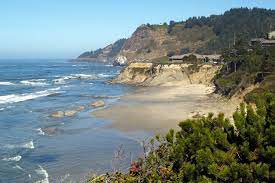A triple threat of accelerating sea level rise, ocean warming, and acidification is putting the very existence of Pacific Islands in jeopardy, according to the latest report by the World Meteorological Organization (WMO). Released at the Pacific Islands Forum in Tonga by United Nations Secretary-General António Guterres and WMO Secretary-General Celeste Saulo, the State of the Climate in the South-West Pacific 2023 report paints a dire picture of the region’s future amid climate change.
The report reveals that sea level rise in the South-West Pacific exceeds the global average, while sea surface temperatures have increased three times faster than the global average since 1980. Marine heatwaves in the region have doubled in frequency and intensity during the same period, posing severe threats to the socio-economic viability of these islands.
“This Pacific paradise is in peril,” warned António Guterres. “Global average sea levels are rising at an unprecedented rate, and the ocean is literally taking the heat. The Pacific Islands, which contribute only 0.02% of global emissions, are uniquely exposed to these impacts.”
The Pacific Islands, with an average elevation of just one to two meters above sea level, are particularly vulnerable. About 90% of the population lives within five kilometers of the coast, and half of the region’s infrastructure is within 500 meters of the sea. The islands face growing risks from more frequent and intense storms, coastal flooding, and saltwater contamination of freshwater supplies.
Guterres emphasized that the threat is not confined to the Pacific Islands alone. "Surging seas are coming for us all," he said, highlighting the global risk to coastal areas, where around a billion people reside. The UN chief called for urgent, drastic cuts in greenhouse gas emissions and increased climate adaptation measures to mitigate the impacts.
The report also underscores the domino effects of recent extreme events in the region, such as the Hunga Tonga-Hunga Ha’apai volcanic eruption in 2022, which triggered a basin-wide tsunami and released massive amounts of water vapor into the atmosphere, affecting the global climate.
WMO Secretary-General Celeste Saulo stressed the critical need for robust early warning systems to protect vulnerable communities. "The ocean, which has absorbed over 90% of the excess heat from greenhouse gases, is undergoing irreversible changes. Human activities have transformed the ocean from a lifelong friend into a growing threat," Saulo said. She also highlighted the importance of the Weather Ready Pacific Programme and other initiatives aimed at building resilience against interconnected and cascading climate risks.
The report details the 34 hydrometeorological hazard events recorded in 2023, including severe tropical cyclones, storms, and floods, which claimed over 200 lives and affected more than 25 million people in the region. Events like Cyclones Kevin and Judy in Vanuatu and Tropical Cyclone Gabrielle in New Zealand are stark reminders of the increasing frequency and severity of extreme weather in the South-West Pacific.
The findings of the report will be further discussed at a forum in Singapore on September 5, 2024, organized by WMO and the ASEAN Specialized Meteorological Centre (ASMC), focusing on building a weather-ready and climate-resilient ASEAN.
The WMO report serves as a wake-up call to the global community, urging immediate action to address the existential threats posed by climate change to the Pacific Islands and beyond.











